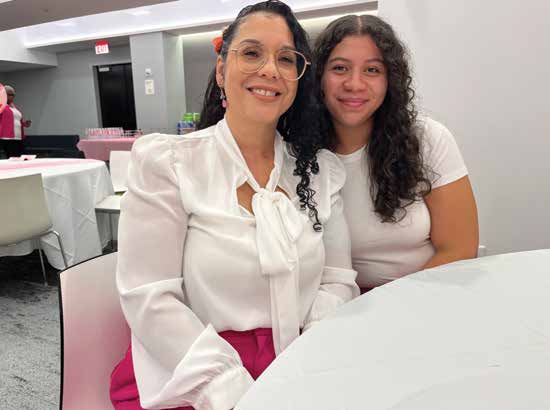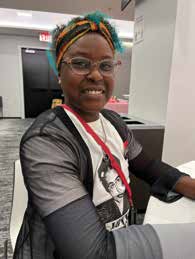Beating Breast Cancer
December 17, 2023
Members raise awareness about the importance of early detection in saving lives

That statistic is even more striking because fewer Black women are diagnosed with breast cancer than white women in the first place.
To raise awareness about this deadly disease—and the importance of early detection in improving outcomes—1199 survivors took part in a “Think Pink, Think Cure” event on October 20, at the Union headquarters.
Lissette Marin, an 1199 Patient Financial Advisor, who works at Columbia University Irving Medical Center, attended the event with her daughter to bring awareness about what it means to be a survivor.
“I was feeling sore on my left side, and I noticed a lump in my breast. When I went for a sonogram and mammogram, I was diagnosed with stage two cancer,” she says.
Marin was diagnosed during the height of the Covid pandemic, but her breast surgeon made sure to keep an operating room available so that she could undergo a lumpectomy after six months of chemotherapy.
“Early detection is crucial,” says Marin, who is currently cancer-free after undergoing radiation following her surgery. “Be aware of changes in your own body and take action. Use your resources. This is one of the reasons why our comprehensive Union health insurance is so important.”

Ayana Jones works as a paid caregiver for her sister who has Down's Syndrome. Her grandmother used to be a nurse and thought she might have a fracture when she first started feeling pain.
She went to the ER at New York Presbyterian Methodist Hospital in Manhattan where they initially told her it was a pulled muscle. Doctors eventually determined that there were cancer cells inside her milk ducts. “It was still early, pre-stage two, but it was aggressive,” says Jones.
She was also diagnosed during the pandemic. “No one could come with me when I did chemotherapy for 20 weeks,” says Jones, who ultimately underwent a double mastectomy.
Medical techniques are developing all the time, and survival rates are improving. Shirley Rhymer, an 1199 Pharmacy Technician at New York Presbyterian Hospital, says her grandmother passed away from breast cancer in her early 40s when her mother was just 15-years-old. But her aunt had a better outcome. Says Rhymer, “She beat breast cancer in her early 70s after having a double mastectomy.”

